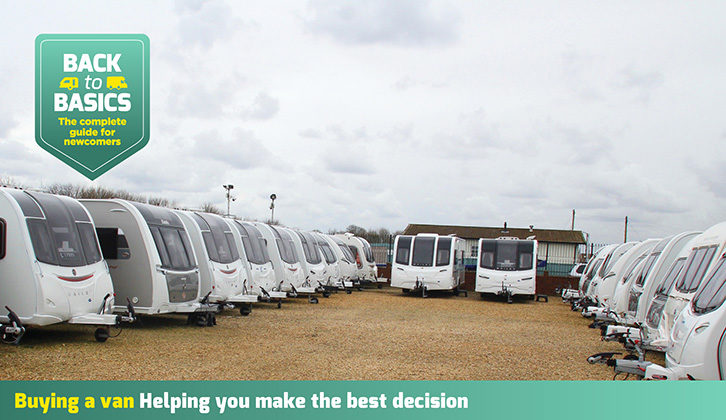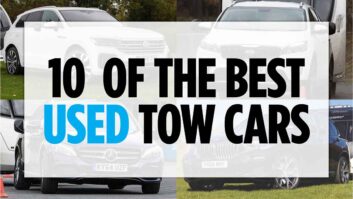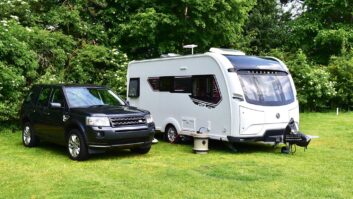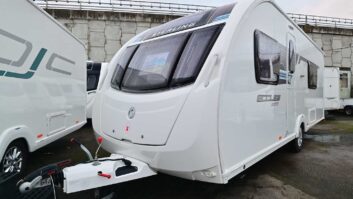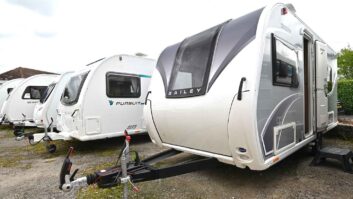Buying a used caravan can save you a lot of money, but it also exposes you to the activities of unscrupulous sellers and scammers, especially if you buy from a private vendor.
A few years ago, I spent a lot of time dreaming about car purchases, scanning the trade magazines for my perfect motor. I soon became adept at spotting the scams. It wasn’t rocket science – they were simply too good to be true: a bargain price, always a tale of woe, and often abroad.
The vendor usually had a very English name, too: Amelia or Caroline, say, and a surprising number were doctors. All contact was by email: ‘Send the money,’ they’d write, ‘then we’ll deliver the car’. And all in strangely flawed English!
More recently, I saw a caravan advert along the same lines. A beautiful Hobby, worth £20,000+, for £6000. The story? An acrimonious divorce, an aggrieved wife wreaking revenge by flogging her ex’s pride and joy. And oh, the van was in Holland.
Well, what a stroke of luck, I was visiting that town next week – could I pop by and pick it up, and pay cash on delivery?
Of course I couldn’t. The van didn’t exist, except in pictures, and when I dropped the woman’s profile photo into Google Images, it turned out that she was a model from
a Brazilian toothpaste advert!
Beware the scammers
These examples show how far scammers will go to relieve you of your hard-earned cash, and how sophisticated they are. The need for vigilance is real. It’s not just scams that are a danger to private buyers: vans can have undiscovered or undisclosed problems that could cost the next owner a packet, so you really need to take care.
However, if you follow our top tips, you should be able to find the best used caravan for you – at a bargain price!
1 Typically, a used caravan can be bought from a major dealership with full facilities, from a smaller dealership (often found on former petrol station forecourts) or from
a private individual via a small ad or a portal such as eBay or Gumtree. If you are buying from a dealership, aim to pay for all of your purchase, or even just the deposit, on a credit card. This ensures your entire outlay will be covered by Section 75 of the Consumer Credit Act (between £100 and £30,000). Different legislation offers protection above this amount.
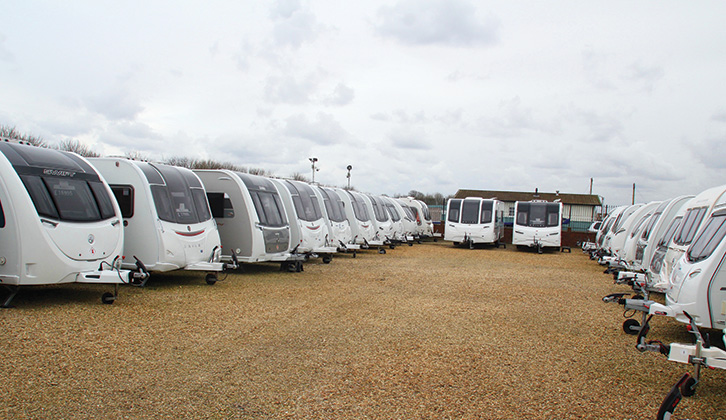
2 Large dealerships have reputations to protect, so buying from one is seen as being a pretty safe bet. Check our Owner Satisfaction Awards results to find one that’s impressed other readers.
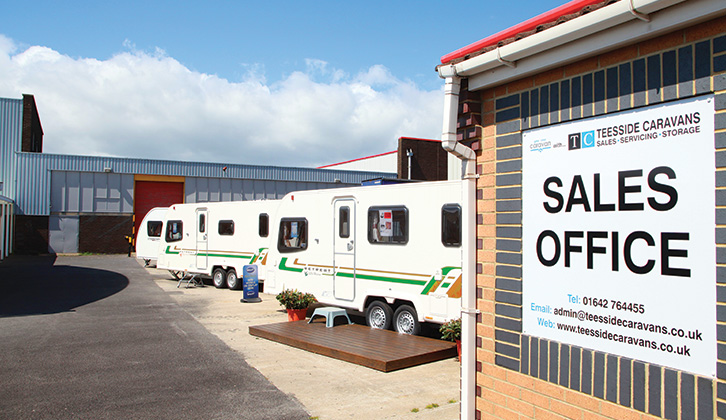
3 Private purchases are covered by the principle of caveat emptor (buyer beware): the responsibility for checking any purchase’s suitability or condition lies with the buyer. You’ll have little comeback if something proves to be wrong.
4 Private sellers often throw in lots of extras with the sale, but with dealerships, you’ll have to negotiate fairly hard. They can make money on your part-exchange, finance, the new van and the extras that they sell you, so negotiate on all of these to get the very best deal.
5 Don’t forget to double check that your tow car can safely and legally pull the caravan you are thinking about buying. Next, consider the layout very carefully. Is it right for you and your family? Sounds obvious, but getting basic decisions such as these wrong can prove costly.
6 Meet the vendor at their home to view the van, not in a random car park or service station.
7 Research similar vans for sale, to get a rough idea of the price you should pay. Print out a screen grab to check the caravan you’re viewing is the same year as that stated in the advert.
8 Online forums can offer a great deal of very useful advice and in-depth detail about problems to look out for with specific ranges and models.
9 View the caravan in daylight and when it’s not raining. Give the exterior a good once-over, looking for evidence of problems such as dents and damage, cracks, scratches, filler and mismatched paintwork.
10 If you’re operating on a tight budget and don’t want to pay for an independent expert to check out your prospective purchase, do make sure that you give the van a thorough inspection yourself.
This should include all of the electrics (when plugged into the mains and on leisure battery). Ask the vendor to chill the fridge before you arrive. Likewise, request that the space and water heating system is on when you arrive (especially with Alde heating, which takes longer to warm up). You’ll soon know if everything’s working as it should.
Check tyre wear, all exterior lights, hitchhead mechanisms and the handbrake and spare wheel.
Then step inside the van to scrutinise taps, showers, toilet flush mechanisms, and the hob, oven and grill.
11 The paperwork is also important – be sure to inspect the most recent service documents to check for any advisories.
12 Inspect all of the windows closely. Are any of them scratched or misted up?
13 Remember, any van that’s been used for one two-week holiday once a year, rather than five UK tours and a trip to Spain, will have experienced much less in the way of wear and tear, but might have suffered from spending long periods immobile in storage.
14 Have a CRiS check done on the tourer. This compares the vehicle’s VIN number with a database listing stolen, damaged and written-off vehicles.
The 17-digit CRiS number is displayed on at least seven of the windows, and stamped onto the chassis. Thieves often try to remove the number by grinding or scratching it off. Walk away from any caravan with CRiS damage. Find out more at cris.co.uk/cris-check.
15 Check all of the van’s ownership and service documentation. Has it been regularly and properly serviced? Was the servicing carried out by a reputable technician? Ask who has done the servicing when you call the seller, then check them out online.
16 Examine the age of the tyres. You’ll find this information on the tyre wall. It comprises two numbers – say, 37 15 – which denotes that the tyre was made in week 37 of 2015.
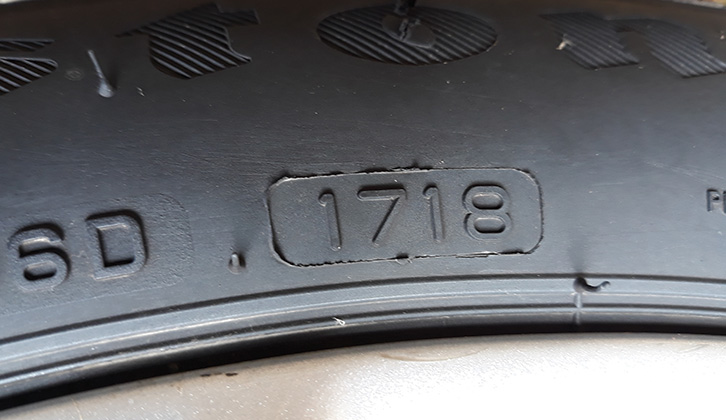
In this case, the van’s tyres – however much tread depth remains – should be replaced in the next few months, because they’ll be five years old in the 37th week of 2020.
17 Check the caravan’s condition match its declared age and usage.
18 Check the floor for delamination. You should be able to feel if the outer veneer of the plywood floor has bubbled up. Take a look inside cupboards and under beds and sofas, too.
19 Damp is the hidden caravan killer. Does the van smell damp when you enter? Heavily fragranced interiors may be hiding something. Look for any signs in corners, including those under the beds and in lockers. Also, check back through the paperwork for any note of damp that’s previously been picked up by a professional tester.
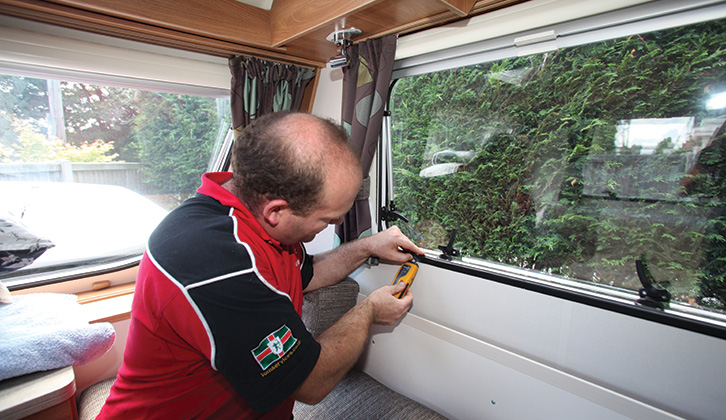
20 Investigate the van’s electrical connector. Is it going to be compatible with your tow car?
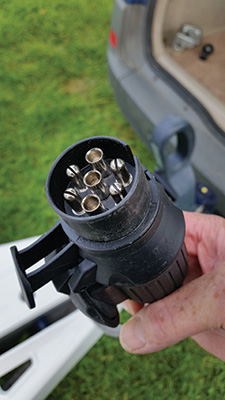
21 Check out the roof of the caravan for signs of damage, and likewise, make sure you also look underneath it for any potential problems with the chassis and floor.
22 Do all of the van’s accessories work? This includes things such as the motor mover, auto-levelling, air-con, alarm, tracker and satellite dish.
23 How old is the van’s leisure battery and is it a reputable brand? Is the gas bottle included in the sale?
24 Are any remote controls supplied and if so, are they working?
25 Are all of the keys available, and do they work properly?
26 Remember, if you intend to bring your new purchase home, you’ll need a numberplate for it!
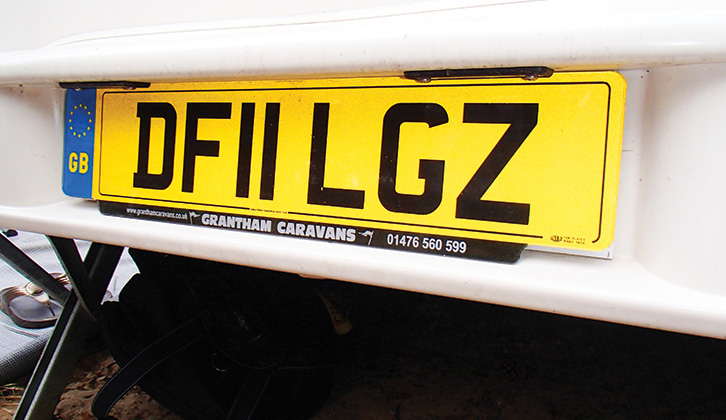
27 Use any problems you find, along with the associated repair costs, to negotiate on price. Take a pen and paper with you to make notes, and factor in the time and travel that the repairs will incur, as well as any lost touring time.
28 Always remember the golden rule: if a deal looks too good to be true, it probably is! And never get involved in sales with vans which are ‘abroad at the moment’ – it’s
very likely to be a scam.
- Take a look at our guide to financing a caravan to find out about the different options for covering the cost of your tourer.
Summary
Buying a used caravan is a really great way to save money, and you’ll find there are some brilliant bargains, if you take your time and you’re prepared to walk away.
Apply our advice and your purchase should be as safe as any can be. The price of buying from a private vendor should reflect the fact that you have little or no comeback – we’d say a minimum of 15-20% less than a large dealership price.
But remember, buying your next van from a passionate caravanner, who feels their beloved van is worth more than a dealership will offer them, can often be the best way to get your hands on an absolutely top-class bargain tourer!
Are you looking for some more buying advice to help you choose the van for you? Then be sure to head to our Back to Basics: Buying a van category!
Our guide to the best used tow cars could help you find the ideal pre-owned towing vehicle to suit your needs.
If you’ve enjoyed reading this article, why not get the latest news, reviews and features delivered direct to your door or inbox every month. Take advantage of our brilliant Practical Caravan magazine SUBSCRIBERS’ OFFER and SIGN UP TO OUR NEWSLETTER for regular weekly updates on all things caravan related.
